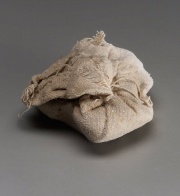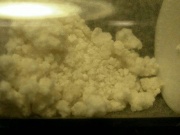Difference between revisions of "Natron"
m (Text replace - "== Authority ==" to "== Sources Checked for Data in Record ==") |
m (Text replace - "\[http:\/\/cameo\.mfa\.org\/materials\/fullrecord\.asp\?name=([^\s]+)\s(.*)\]" to "$2") |
||
| Line 2: | Line 2: | ||
== Description == | == Description == | ||
| − | 1) An old name for native [ | + | 1) An old name for native [[sodium%20carbonate|sodium carbonate]]. Sodium carbonate occurs as a mixture of the minerals thermonatrite (hydrate), natron (decahydate), and [[trona|trona]] (sesquicarbonate). |
2) A naturally occurring mineral composed of sodium carbonate decahydrate. | 2) A naturally occurring mineral composed of sodium carbonate decahydrate. | ||
| − | 3. The name 'natron' is commonly used for the natural mixture of [ | + | 3. The name 'natron' is commonly used for the natural mixture of [[salt|salts]] obtained from the dry lake beds and mineral deposits. Its composition can vary widely: sodium carbonate (5-75%), [[sodium%20bicarbonate|sodium bicarbonate]] (5-32%), [[sodium%20chloride|sodium chloride]] (0-62%), [[sodium%20sulfate%2C%20anhydrous|sodium sulfate]] (0-70%), [[silica|silica]] (3-10%), [[water|water]], and insoluble components (0-17%: such as [[calcium%20carbonate|calcium carbonate]], [[magnesium%20carbonate|magnesium carbonate]], [[alumina|alumina]], [[ferric%20oxide|iron oxide]], and organic matter). In ancient Egypt, natron was used for making [[incense|incense]], manufacturing [[glass|glass]], for bleaching [[linen|linen]], and as a [[preservative|preservative]] in the mummification process. |
[[File:pn31267natron.jpg|thumb|Natron]] | [[File:pn31267natron.jpg|thumb|Natron]] | ||
Revision as of 10:42, 10 May 2016
Description
1) An old name for native Sodium carbonate. Sodium carbonate occurs as a mixture of the minerals thermonatrite (hydrate), natron (decahydate), and Trona (sesquicarbonate).
2) A naturally occurring mineral composed of sodium carbonate decahydrate.
3. The name 'natron' is commonly used for the natural mixture of salts obtained from the dry lake beds and mineral deposits. Its composition can vary widely: sodium carbonate (5-75%), Sodium bicarbonate (5-32%), Sodium chloride (0-62%), sodium sulfate (0-70%), Silica (3-10%), Water, and insoluble components (0-17%: such as Calcium carbonate, Magnesium carbonate, Alumina, iron oxide, and organic matter). In ancient Egypt, natron was used for making Incense, manufacturing Glass, for bleaching Linen, and as a Preservative in the mummification process.
Synonyms and Related Terms
natrite; soda; mineral alkali; sodium carbonate decahydrate; sodium sequicarbonate; natron (Fr., It.)
| Composition | Na2CO3.10H2O |
|---|
Additional Information
A. Lucas, J.R. Harris, Ancient Egyptian Materials and Industries, Edward Arnold Publishers Ltd., London, 1962, p. 493-494.
Sources Checked for Data in Record
- R. Mayer, The Artist's Handbook of Materials and Techniques, Viking Press, New York, 1981
- A.Lucas, J.R.Harris, Ancient Egyptian Materials and Industries, Edward Arnold Publishers Ltd., London, 4th edition, 1962
- Encyclopedia Britannica, http://www.britannica.com Comment: "sodium carbonate; thermonatrite" Encyclopædia Britannica [Accessed September 23, 2002
- Richard S. Lewis, Hawley's Condensed Chemical Dictionary, Van Nostrand Reinhold, New York, 10th ed., 1993
- Susan E. Schur, Conservation Terminology: A review of Past & Current Nomenclature of Materials, Technology and Conservation, Spring (p.34-39); Summer (p.35-38); Fall (p.25-36), 1985
- The American Heritage Dictionary or Encarta, via Microsoft Bookshelf 98, Microsoft Corp., 1998

